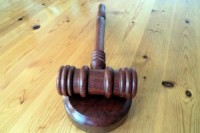
For the first time in its history, the law school’s Edward T. & Noble W. Lee Chair in Constitutional Law has been jointly awarded to two scholars. Professors Hugh Mundy and Steven D. Schwinn will share the coveted professorship for the 2022-2023 academic year with Mundy holding the chair during the fall semester and Schwinn holding the title in spring 2023. The long-revered pair are planned to collaborate in spring 2023 on an event that highlights the results of their individual research.
“It’s hard to envision a circumstance that more appropriately calls for a shared Lee Chair appointment,” offered Interim Dean Julie Spanbauer. “The research proposed by Professors Mundy and Schwinn will explore topics of critical importance, given recent events in our society. These are two very deserving scholars.”
Professor Hugh Mundy’s scholarship will explore challenges to “no knock” warrants under the Equal Protection Clause of the Fourteenth Amendment. The use of no-knock warrants, which authorize police officers to enter a property without announcing their presence beforehand, is estimated to have increased at alarming rates between 1980 and 2010 and to have disproportionately impacted Black suspects and households though studies have historically been limited. Mundy will collect data on “no-knock” warrant usage in Chicago and other metropolitan areas to consider obstacles to equal protection challenges, develop a legal framework for raising challenges, and offer a remedy in support of future success.
Professor Steven Schwinn intends to develop a theory of separation of power under the U.S. constitutional system that goes beyond the current limited Supreme Court focus on individual liberty, and occasional reference to democratic accountability and institutional competence. Schwinn suggests the separation of powers should promote citizens to influence government policy beyond just voting and speech, and he will research ways to broaden and diversify thinking about democratic accountability, individual and collective well-being, good governance, rule of law, federalism, and more. Schwinn intends to provide a new and valuable perspective on the separation of powers capable of influencing government policy and separation-of-powers jurisprudence at the state and federal levels.
Mundy and Schwinn will become the ninth professors to hold the chair. They follow Professor Cecil Hunt II who served as Lee Chair from 2018-2019. Hunt’s research focused on mass incarceration, racial discrimination and the incompatibility of private for-profit prisons and human rights at the intersection of the 14th amendment’s constitutional guarantee of equal protection. The law school did not name a lee chair scholar during the past two academic years of the pandemic.
Professor Mundy is the Lead Editor of Illinois Criminal Procedure and the author of numerous law reviews and columns. Before entering legal academia, he was an Assistant Federal Public Defender for eight years working first in the Middle District of Tennessee and then in the Southern District of New York. He was selected as one of the inaugural faculty recipients of the law school’s Antiracism and Social Justice Fund in 2020. He joined the law school faculty in 2012 and became a tenured Associate Professor in 2017.
A renowned constitutional scholar and commentator, Professor Schwinn previously held the Lee Chair in Constitutional Law during the 2015-2016 academic year and focused his scholarship on the right to a remedy for torture. He is a co-founder of the Constitutional Law Prof Blog and Editor of the American Constitution Society Supreme Court Review. He joined the law school in 2007 and gained tenure in 2012.
About the Edward T. & Noble W. Lee Chair in Constitutional Law
The Lee Chair was established in 2010 in the name of the third and fourth deans of the law school, Edward T. Lee, and his son, Noble W. Lee, who collectively served the institution for 90 years, including 65 years as deans. The Lee Chair in Constitutional Law was established to honor their contributions to the law school and the legal profession, and their shared interest in constitutional law.

